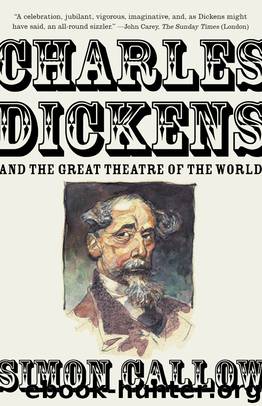Charles Dickens and the Great Theatre of the World by Simon Callow

Author:Simon Callow [Callow, Simon]
Language: eng
Format: epub
ISBN: 978-0-345-80324-5
Publisher: Knopf Doubleday Publishing Group
Published: 2012-08-06T16:00:00+00:00
Even as he moodily and metaphorically contemplated the dead old man, his sense of humour, which rarely deserted him entirely, however wretched and restless he might be, asserted itself: ‘I find I’m getting Inimitable, so I’ll stop.’
Later, Forster arrived, and they did the rounds together – plays, cabarets, operas, galleries – and visited the great: the poet-politician Lamartine, the prolific melodramatist Scribe, and Victor Hugo, again, ‘by whom Dickens was received with infinite courtesy and grace’. Dickens spoke French poorly, according to Forster, ‘his accent being somehow defective’, but he ‘practised himself into writing it with remarkable ease and fluency’. All the while, he continued writing Dombey. At a certain point, finding that the next number of the novel was short by two pages, he had to rush back to London to make up the shortfall while the printers waited, then returned to Paris, but almost immediately went home again because of Charley Dickens’s having succumbed to scarlet fever. Back in London, work on Dombey was slow. He slithered into a despairing lethargy. His wretchedness, he told Georgy, was ‘inconceivable’; writing was agonizing. But the public response to the story was phenomenal; Macready confided to his diary that after reading the seventh number, he had been unable to speak to Dickens for sobs. Thackeray, at the time a serious rival, burst into his publisher’s brandishing the offending edition and crying: ‘There is no writing against such power as this – One has no chance! – it is unsurpassed – stupendous!’ The spectre of Chuzzlewit’s relative failure had been at last laid to rest. But the success did nothing to assuage Dickens’s restlessness. His already tense state was rendered worse by an unprovoked attack on him by one of his horses, ‘under the impression that I had gone into his stall to steal his corn, which upon my honour I had no intention of doing’. The attack left him feeling a ‘low dull nervousness of a most distressing kind’ for some time.
Catherine, meanwhile, gave birth to their seventh child, Sydney. She suffered excruciatingly: the specialist said he had never seen anything like it. Dickens was appalled – ‘my dear Kate suffered terribly’ – but there seems to have been no thought in his mind to avoid the cause of the suffering. During this period he was, as it happens, much preoccupied with the situation of women, specifically those then referred to, without inverted commas, as ‘fallen’. The work of rehabilitating them was a passion of Angela Burdett-Coutts, the formidable daughter of the noted Radical MP, Sir Francis Burdett; her grandfather on her mother’s side was a distinguished banker, whose fortune of £3 million she inherited at the age of twenty-three, at which point, she incorporated his name into hers. At a stroke, she became the richest woman in England; by the time of her death, in 1906, she had distributed in philanthropic gifts the exact amount of her original inheritance. She met Dickens in 1839, two years after she came into
Download
This site does not store any files on its server. We only index and link to content provided by other sites. Please contact the content providers to delete copyright contents if any and email us, we'll remove relevant links or contents immediately.
| Ancient & Classical | Arthurian Romance |
| Beat Generation | Feminist |
| Gothic & Romantic | LGBT |
| Medieval | Modern |
| Modernism | Postmodernism |
| Renaissance | Shakespeare |
| Surrealism | Victorian |
4 3 2 1: A Novel by Paul Auster(11071)
The handmaid's tale by Margaret Atwood(6867)
Giovanni's Room by James Baldwin(5889)
Big Magic: Creative Living Beyond Fear by Elizabeth Gilbert(4730)
Asking the Right Questions: A Guide to Critical Thinking by M. Neil Browne & Stuart M. Keeley(4591)
On Writing A Memoir of the Craft by Stephen King(4220)
Ego Is the Enemy by Ryan Holiday(3999)
Ken Follett - World without end by Ken Follett(3980)
The Body: A Guide for Occupants by Bill Bryson(3813)
Bluets by Maggie Nelson(3721)
Adulting by Kelly Williams Brown(3678)
Guilty Pleasures by Laurell K Hamilton(3597)
Eat That Frog! by Brian Tracy(3522)
White Noise - A Novel by Don DeLillo(3439)
The Poetry of Pablo Neruda by Pablo Neruda(3370)
Alive: The Story of the Andes Survivors by Piers Paul Read(3317)
The Bookshop by Penelope Fitzgerald(3234)
The Book of Joy by Dalai Lama(3231)
Fingerprints of the Gods by Graham Hancock(3218)
